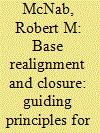| Srl | Item |
| 1 |
ID:
053224


|
|
|
| 2 |
ID:
071970


|
|
|
|
|
| Publication |
2006.
|
| Summary/Abstract |
Many authors contend that ethnic extremism coupled with political manipulation were the primary factors behind the Rwandan genocide. Yet, to oversimplify the cause of this tragedy makes one blind to the complicated nexus that generated the outcome. Even though this genocide was quick in its execution, the events that lead to this massacre took years to unfold. We argue that the evolution of human capital and the competition for scarce resources contributed to the genocide.
|
|
|
|
|
|
|
|
|
|
|
|
|
|
|
|
| 3 |
ID:
093513


|
|
|
| 4 |
ID:
155837


|
|
|
|
|
| Summary/Abstract |
This paper empirically examines whether the aging of a fleet affects operational availability and operating cost using a unique data-set on the 117 47-foot Motor Lifeboats (MLBs) of the United States Coast Guard (USCG). Procured from 1997 to 2003, the 47-foot MLB is the standard lifeboat of the USCG and all 117 MLBs remain in service. The aging of the MLB fleet has resulted in higher annual operating costs and lower operational availability, although the nature of this relationship remains unclear. Our estimation strategy utilizes an error components estimator to examine these issues. We employ three variants of the dependent variables (i.e. the standard logarithmic transformation as is most commonly seen in the literature, inverse hyperbolic sine [IHS], and level outcomes). The point estimates from the standard logarithmic model finds operational availability for the MLBs decreases at a rate between 0.83 and 1.8% per year and cost increases at a rate between 0.33 and 7.81% per year. Similar effects are shown with the IHS and level outcome specifications. In terms of nonlinearity effects, we find the most pronounced changes in operational availability and cost occur for MLBs aged 15 years or more (in comparison to younger MLBs).
|
|
|
|
|
|
|
|
|
|
|
|
|
|
|
|
| 5 |
ID:
091498


|
|
|
|
|
| Publication |
2009.
|
| Summary/Abstract |
This paper examines whether non-lethal weapons (NLWs) enhance the capability of the US armed forces to conduct irregular warfare (IW) operations. With expectations that the operational environment will only continue to become more complex in the future, NLWs may reduce the level of violence received, as well as dispensed, by US forces while performing tasks in the IW spectrum. We argue that NLWs increase the ability of US forces to address the long tail of warfare and their deployment should be increased in the near term.
|
|
|
|
|
|
|
|
|
|
|
|
|
|
|
|
| 6 |
ID:
080109


|
|
|
|
|
| Publication |
2007.
|
| Summary/Abstract |
In this paper, we examine the current state of knowledge in the economics literature on the conduct of reconstruction activities in Iraq and Afghanistan. As stabilisation and reconstruction missions grow in importance for units deployed to these regions, it becomes more important to understand what activities can promote economic growth at the local level. While military operations focus on interdicting the insurgency, successful counter-insurgency campaigns have typically addressed the conditions conducive to the insurgency. Mitigating the incentives for individuals to participate in an insurgency is imperative. Well-crafted and timed reconstruction activities can, we argue, attenuate these incentives
|
|
|
|
|
|
|
|
|
|
|
|
|
|
|
|